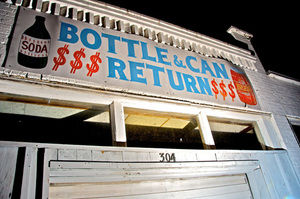I was excited when I heard back in September that one of the ballot questions for the midterms would be about the current Bottle Bill. The Bottle Bill, according to its proponents, “would expand the state’s beverage container deposit law, to require deposits on containers for all non-alcoholic non-carbonated drinks in liquid form intended for human consumption, except beverages primarily derived from dairy products, infant formula, and FDA approved medicines.”
Because I have a deep background in sustainable farming, recycling efforts within my high school, and encouraging community task forces to be more materially aware, it sparked an old part of me I wished to revisit.
My prior experience with the bottle bill’s target problem excited me. The campaign being led on campus by MASSPIRG excited me. The whole thing excited me.
And then, Massachusetts let me down.
Massachusetts went to the polls on Nov. 4 (thank you if you voted!) to let the state know what they wanted, and they really disliked the Bottle Bill reform. The Question lost with 73.5 percent of voters concluding that they did not want to see the Bottle Bill passed. That leaves a measly 26.5 percent of Massachusetts voters that showed up and voted positively for the Bottle Bill.
Now we have to consider: why does this matter?
The Bottle Bill would have forced distributors to charge more for their product which, in turn would have made the direct sales price increase. I get it, nobody wants to pay more for their product; money is always tight. This may have been the leading factor in why the bill received so many downvotes.
I still don’t think that justifies the bill being turned down by the margin it did. Massachusetts should have at least had a higher positive voter turn up.
Look at the current environmental state. It’s easy to see all the motives to clean the world up. There’s tons of state and federally funded programs to increase awareness about environmental issues. You see it everywhere: the little fish in the hand soap bottle reminding you to recycle, the campus and other public areas that now have designated recycle areas, and even on the dump truck driving down Newbury St. on a busy Thursday night that says: “Boston Recycles More!” The national, or even global, awareness movement is there, screaming “RECYCLE!” to our faces.
Has Massachusetts turned blue on the blue bin, though?
The bill would have strongly supported what Massachusetts needs — another step in the direction of environmental policy where consumers and companies are rewarded for being environmentally conscious. Had the bill passed, the community actively recycling would have been rewarded for recycling material they would typically not be rewarded for.
It would have incentivized the keeping of our landfills empty. It would have ensured our landfills would stop overflowing with material that was reusable. Even the individuals who do not typically recycle would be moved towards a more green and aware method of disposal. And thus, a cleaner, more environmentally friendly Massachusetts.
Massachusetts has gone blue. Maybe it’s that we’re too desensitized to the issue, or maybe we truly don’t care any longer to recycle. Regardless, I’m not sure how anyone’s common sense could allow them to become okay with allowing extreme cases of pollution and not wanting to employ effective methods of clean up.
The next time you sit down to eat lunch, go into a store, or walk down the road in one of the less clean neighborhoods in Boston, take a look at the number and types of bottles you see lying about. Chances are that many of those bottles are not redeemable for any monetary value within the state of Massachusetts.
Where do you think all these bottles go? Unfortunately, the larger portion of them don’t go to recycling plants where they could be turned into new bottles. And thanks to the Bottle Bill rejection, the bottle will continue to remain out of recycling centers, adding to our ever-growing pollution and material waste problem.

